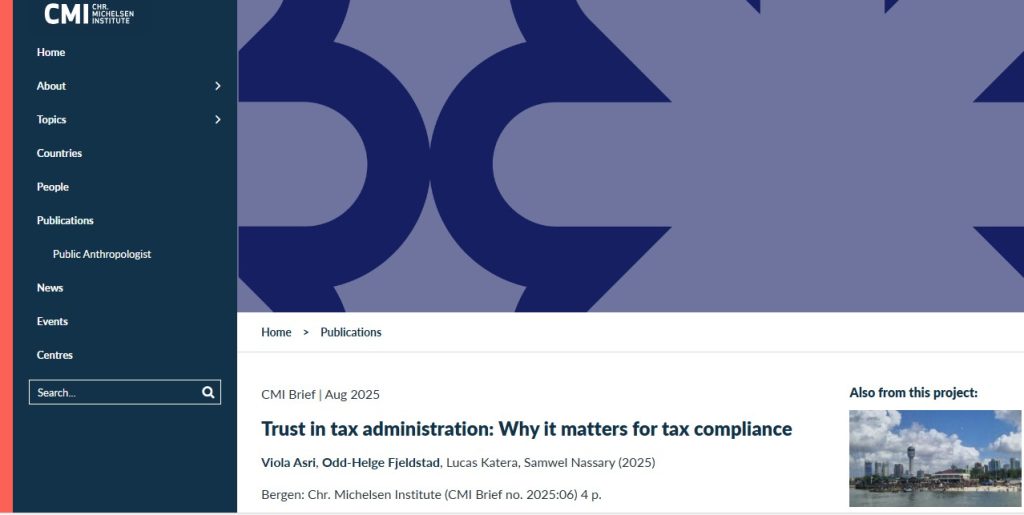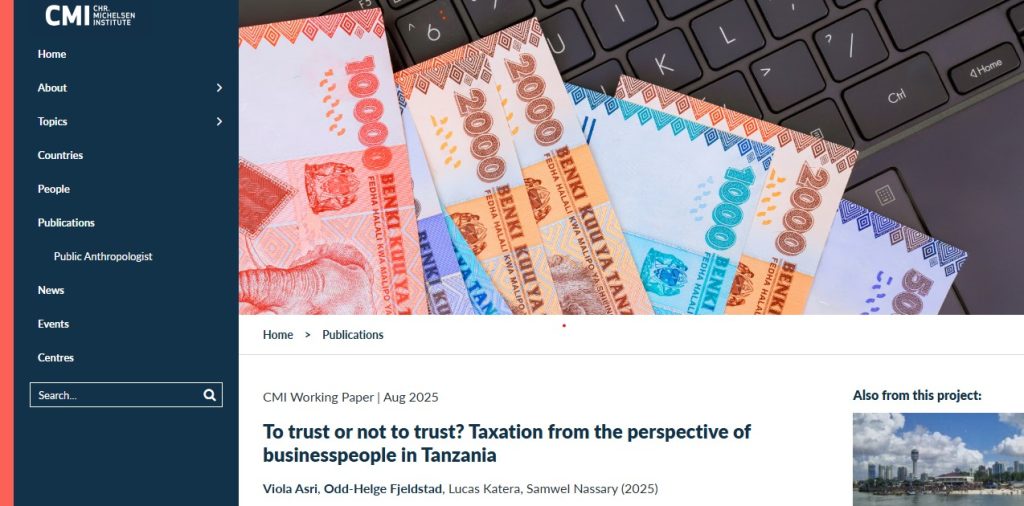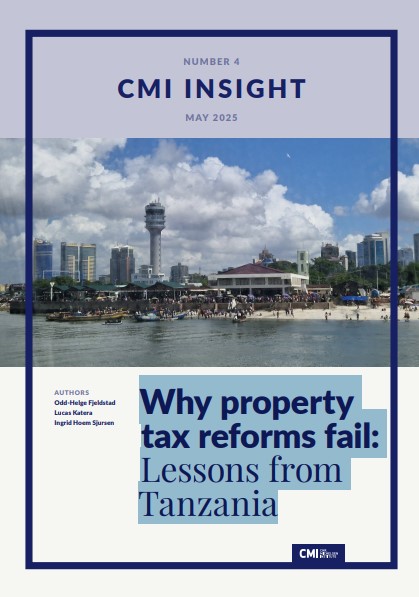Trust in tax administration: Why it matters for tax compliance

Trust is a foundational component of any tax system, particularly in environments where enforcement capacity is weak. In Tanzania, businesspeople exhibit low levels of trust in tax authorities, undermining voluntary compliance and weakening the legitimacy of the tax system. However, trust is not static; it can be built – and rebuilt – through better services, […]
To trust or not to trust? Taxation from the perspective of businesspeople in Tanzania

Given the limited capacity for effective tax enforcement and monitoring in developing countries, taxpayers’ trust in the tax system is essential for fostering voluntary tax compliance. Since businesses account for a substantial portion of tax revenues, this paper examines the factors that predict trust in the tax authority, drawing on a large-scale survey of businesspeople’s […]
Why property tax reforms fail: Lessons from Tanzania

Over the past two decades, property tax administration in Tanzania has undergone substantial changes, shifting between decentralized and centralized collection models. However, despite numerous reform initiatives, these efforts have largely failed to boost tax revenues and improve property tax administration. This CMI (in collaboration with REPOA) Insight outlines five reasons why these reforms have not […]
Taxation and Business Development in Zanzibar: Insights from a Business Survey

The private sector is a critical driver of economic growth in Tanzania. The government has expressed a strong commitment to fostering a vibrant business environment while ensuring sufficient public resources for economic development. However, balancing taxation and business growth remains a challenge. This report presents findings from a survey of businesspeople in Zanzibar, examining their […]
Understanding the resource curse: A large-scale experiment
on corruption in Tanzania
Although there seems to be a consensus that a resource curse often exists (with the notable exceptions of Brunnschweiler and Bulte (2008) and van der Ploeg and Poelhekke (2010)), the empirical literature faces greater challenges in establishing why natural resource wealth is often associated with undesirable outcomes, because cross-country comparisons are plagued with endogeneity issues […]
Policy implementation under stress
Central-local government relations in property tax administration in Tanzania Inter-organisational cooperation in revenue collection has received limited attention in the tax administration literature. Recent experiences from Tanzania offer a unique opportunity to examine opportunities and challenges facing such cooperation between central and local government agencies in a developing country context. The administration of property taxes […]
Non-resource taxation in a resource rich setting
A broader tax base will enhance tax compliance in Tanzania Huge reservoirs of natural gas have been discovered offshore the southern coast of Tanzania. The country might become a large producer of gas, and a potential exporter of liquefied natural gas (LNG) during the next decades.
Local Government Finances and Financial Management in Tanzania
Empirical Evidence of Trends 2000-2007 This paper examines the capacity of local government authorities in Tanzania with respect to financial management and revenue enhancement, and analyses trends in financial accountability and efficiency for the period 2000–2006/07.
Planning in Local Government Authorities in Tanzania: Bottom-up Meets Top-down
This brief examines the experience of four councils in Tanzania in implementing Opportunities and Obstacles to Development (O&OD), a bottom-up participatory planning methodology for local development. The study found little evidence to date that the approach has increased local autonomy in prioritising, planning and budgeting of development activities. Interactions and consultations between local communities and […]
Outsourcing Revenue Collection to Private Agents
Experiences from Local Authorities in Tanzania This paper examines experiences with an outsourced revenue collection of some local authorities in Tanzania, looking at how systems of privatized tax collection perform with respect to revenue generation, administration and accountability from 1996 to 2006.
Maybe We Should Pay Tax After All? Citizens’ Views on Taxation in Tanzania
This paper aims to shed light on factors impacting on tax compliance, by examining the perceptions of ordinary people on payment of taxes, fees, and charges. Changes in citizens’ perceptions of taxation may have implications for policy design to raise…
Disparities Exist in Citizens’ Perceptions of Service Delivery by Local Government Authorities in Tanzania
Changes in Citizens’ Perceptions of the Local Taxation System in Tanzania
This brief examines changes in citizens’ perceptions of local taxation in six councils in Tanzania; investigating why residents do or do not pay local taxes, and their perceptions of misuse of tax revenue. The brief also provides recommendations on measures
Citizens Demand Tougher Action on Corruption in Tanzania
To inform ongoing anti-corruption efforts at both local and national levels, the views and experiences of citizens are essential for assessing the extent of corruption and for designing effective anti-corruption measures.
Outsourcing Revenue Collection: Experiences from Local Government Authorities in Tanzania
Many local government authorities in Tanzania have reformed their tax collection systems in recent years in order to increase their revenue. This brief examines recent experiences with privatised revenue collection in seven urban and rural councils in…
Local Government Reform in Tanzania, 2002 – 2005: Summary of Research Findings on Governance, Finance and Service Delivery
The Local Government Reform Programme (LGRP) aims to transfer duties and financial resources from central to local government levels. Local government authorities are thought to be in a better position to identify people’s needs by encouraging citizens’ participation in democratic governance, and thus supply the appropriate form and level of public services.